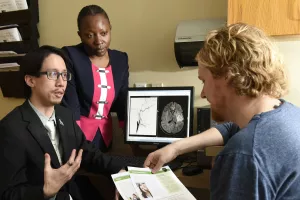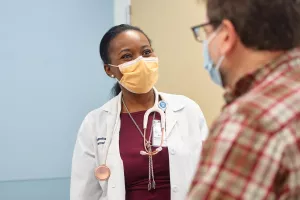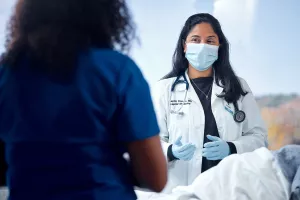Strokes can happen to anyone at any age, but those under 50 may need extra support to prevent them from happening again, aid in recovery and assist with adapting to life after a stroke.
Strokes can happen at any age
Did you know that strokes can happen to anyone, no matter their age? Even younger adults and children are experiencing strokes more often these days. Whether you're in the middle of your career, starting a family, still in school, or haven't even been born yet, a stroke can affect you. If you've had a stroke and are under the age of 50, we are here to support you by identifying the causes of your stroke, helping you prevent future strokes, estimating your risk for recurring strokes and complications, and providing counseling for stroke survivorship.

Conditions
When a blood clot or fatty deposits block the blood supply or a blood vessel ruptures in the brain, it results in a stroke. The impact of a stroke varies for each individual and may not always be long-lasting.
- Ischemic stroke: Blood clots that block arteries and travel to the brain, limiting oxygen and nutrients and killing brain cells. The majority of strokes in young people experience this type.
- Intracerebral hemorrhagic stroke: Blood vessels leak or rupture, resulting in bleeding in the brain. This type of stroke is less common.
- Transient ischemic attack (TIA): A "ministroke" that causes a temporary decrease in blood supply to your brain.
Testing
We provide advanced testing that is tailored to each patient's symptoms, story, and health to determine the cause of your stroke. Our goal is to find the cause of your stroke so we can help you manage any associated issues throughout your life. Tests may include:
- CT angiogram
- Electrocardiogram (ECG or EKG)
- Blood tests
- Chest X-ray
- Urine tests
- Cardiac telemetry
- Brain MRI
- Echocardiogram
- Catheter angiogram
- CT of the torso
- MRI of the pelvis
- Doppler ultrasound of the legs
Treatments
If you are a young adult who has had a stroke without a clear cause, you may be diagnosed with cryptogenic stroke. This type of stroke can result in permanent damage by depriving part of the brain of oxygen and nutrients. Young adults with stroke may have to manage persistent symptoms and neurological deficits for decades, unlike many other stroke sufferers whose symptoms may fade with time.
We will help you reduce the risk of future strokes, manage any persistent symptoms, and provide surveillance and treatment for any late complications that may arise. We will work closely with your primary care physician and other specialists to coordinate your care holistically.
Post-stroke care
Everyone's stroke recovery journey is unique. Some people may fully recover, while others may experience ongoing challenges. It's important to understand that healing can take weeks to months or even years. We are committed to helping you navigate your life after stroke and will work with you to:
- Minimize your risk of future strokes (resulting from the same cause as the first stroke or other causes that might develop over time)
- Manage persistent symptoms (language problems, weakness, spasticity, neuropathic pain, headache, lethargy, etc.)
- Provide surveillance and treatment for late complications (epilepsy, depression, cognitive impairment, adverse effects to treatments, etc.)
Survivorship + on-going support
Our aim is to lend a helping hand to young adults who have undergone a stroke by providing personalized survivorship services. We understand that there is no "one-size-fits-all" approach to recovery. Our aim is to help you either return to your old life or adapt to your new one and find fulfillment.
One thing to note is that young adult stroke survivors are susceptible to medical complications, including:
- Strokes
- Cardiovascular diseases
- Cancer
- Depression
- Anxiety
- Neurologic complications like seizures (epilepsy) and cognitive impairment
We'll also be by your side if you have non-medical complications like:
- Difficulty returning to work
- Strain on relationships
- Problems with intimacy and sexual relations
- Difficulty with returning to driving
- Social isolation
Risks are not the same for everyone, and they may change over time due to treatment and lifestyle changes. We aim to help you understand and evaluate your health risks, develop and implement strategies to reduce those risks and inspire you to live your life without fear and to the fullest.

From regular office visits to inpatient stays, find the healthcare you need and deserve close to home.

Meet the doctors and care team devoted to supporting you every step of the way along your path to better health.